Microsoft has made reply all the default email reply method in Outlook on the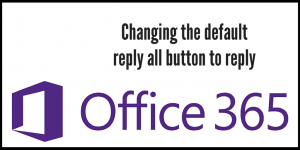 Web. See the instructions for changing the default setting to reply.
Web. See the instructions for changing the default setting to reply.
If you have any questions, contact the IT Help Desk, helpdesk@ksu.edu, or 785-532-7722.
Microsoft has made reply all the default email reply method in Outlook on the Web. See the instructions for changing the default setting to reply.
Web. See the instructions for changing the default setting to reply.
If you have any questions, contact the IT Help Desk, helpdesk@ksu.edu, or 785-532-7722.
Microsoft recently rolled out a new feature that allows you to pin a message or messages to the top of your inbox. Keep those important messages from getting buried by using the pin feature.

If you have any questions, contact the IT Help Desk, helpdesk@k-state.edu, 785-532-7722.
Over the last few weeks, Microsoft began upgrading K-State email accounts with a new Outlook Web App (Webmail) experience. Some of the new enhancements delivered in this upgrade are:
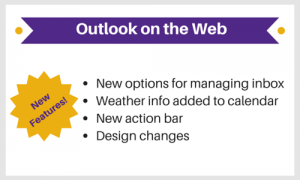 of the inbox.
of the inbox.For a more detailed look at all of the changes see New features coming to Outlook on the web.
by Information Technology Services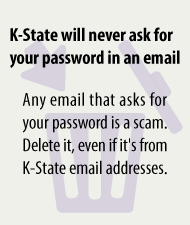
K-State employees have recently been targeted by a “TIAA-CREF re-authenticate your account” email phishing scam that has been involved in at least three rounds of attacks.
On July 6, Human Capital Services emailed K-State employees with a TIAA-CREF account that K-State is blocking the URL in the scam, so computers on the university network cannot access the intended web address.
If you have replied to the TIAA-CREF email scam or any other email that asked for account information, contact the IT Help Desk as soon as possible (214 Hale Library, helpdesk@k-state.edu, 785-532-7722, toll-free 800-865-6143).
Simple rules will protect you from all kinds of scams: Never provide a password or personal identity information in response to email. Never use your K-State eID password on any other account. Continue reading “Dangerous phishing-scam emails steal more than passwords”
At 4:34 a.m. Friday, K-State began experiencing intermittent problems connecting to various systems in the data center. Information Technology Services staff along with our vendor partner, Cisco, began investigating immediately. While most K-Staters continued to have email access, other systems such as K-State Online Classic and Canvas, the K-State Web pages and some administrative systems were unavailable. Continue reading “Technology outage result of network traffic”
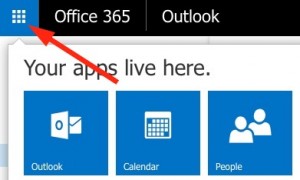 On Jan. 21, Microsoft began rolling out a new app launcher feature for webmail and Office 365.
On Jan. 21, Microsoft began rolling out a new app launcher feature for webmail and Office 365.
When using webmail, the menu items that used to reside at the top of the webmail screen — such as Outlook, Calendar, People and Tasks — have been bundled together into a new app launcher menu.
The app launcher menu resides in the upper left-hand corner of the webmail screen. Click the menu button to find Outlook, Calendar, People and Tasks.
This new app launcher menu will continue to grow in functionality in the coming weeks and months as new services become available to K-State. For more information on the app launcher, see Microsoft’s blog post “Organize your Office 365 with the new app launcher“.
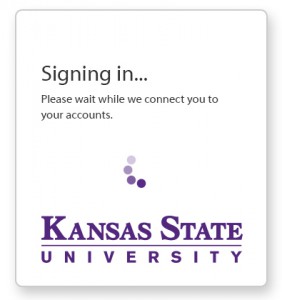
On Dec. 22, Information Technology Services will be making changes to the authentication system that K-Staters use to access some IT resources. When accessing Webmail, K-Staters will see a new progress screen that shows the Kansas State University wordmark and a spinning wheel.
The new authentication step is necessary to bring IT systems online, such as Microsoft’s OneDrive and Office for home and personal use.
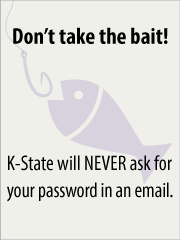 The beginning of every semester, K-State sees a significant increase in the number of phishing-scam emails trying to steal eID passwords. These emails try to trick K-Staters into providing their eID and password to criminals under the guise of “false emergency” emails, including:
The beginning of every semester, K-State sees a significant increase in the number of phishing-scam emails trying to steal eID passwords. These emails try to trick K-Staters into providing their eID and password to criminals under the guise of “false emergency” emails, including:
THESE ARE ALL SCAMS. K-State Information Technology Services staff will NEVER ask for your password in an email. Do not reply to these scam emails, or click a link in email and fill out a form with your eID and password.
Abide by one simple rule and you will be safe from these scams and others: NEVER provide your password to anyone in response to an email! Continue reading “Increase in phishing-scam emails trying to steal K-State eID passwords”
by Information Technology Services
Microsoft has increased the maximum amount of K-State central email storage to 50 gigabytes. This is a doubling of storage from its previous maximum of 25GB. Continue reading “Office 365 email storage upped to 50GB and new feature rolling out”
by Information Technology Services
Office 365 retention settings will be activated on the evening of Friday, April 11. These retention settings govern the automatic management of emails that have been moved to the Deleted Items folder and Junk Email folder. A couple of things to note: Continue reading “Office 365 email-retention settings go into effect April 11”